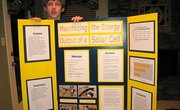When designing a science project, it is essential to create a project write-up that your audience can understand and that effectively communicates the salient points of your experiment. You should begin by making a quality draft of your project write-up that cogently describes all the work that has been done in the field on the topic of your project, the novelty of your project, the steps that you took to experiment and what you learned from experimenting.
Write a paragraph introducing your experimental question, or what you sought to prove or learn by carrying out this project. After the introductory paragraph, provide a few paragraphs of background information on the project. Describe past experiments that are relevant to the project, as well as the holes in current research and the subsequent need to carry out your project.
Include your hypothesis. If your experimental question concerns whether peppered moths exposed to soot over a period of months will turn black, in your hypothesis, you should tell your audience whether you think they will turn black.
Write a paragraph summarizing the materials you used. Go back, when writing your final draft, and specify the brand names of any science equipment you used, as well as the company supplying your compounds.
Detail, in two to three paragraphs, your experimental methods. Prepare to write enough detail in your final draft that another scientist, after reading your methods section, would be able to replicate your procedure.
Provide your results, in graph and tabular format. In the discussion section, outline as many paragraphs as you need to describe your experimental results and their significance. Outline a discussion of how your results may support or not support your hypothesis, and be sure to expand your discussion when writing your final draft.
Summarize your conclusions. You can do this in a few sentences in your rough draft, outlining whether you think your data supports your hypothesis and why. When writing your final draft, remember to acknowledge the help of anyone who supported your project, with science advice, financial help or even moral support.
Be sure to cite all scientific sources from which you drew information in your references section, when you write your final draft.
Related Articles
Writer Bio
Tricia Lobo has been writing since 2006. Her biomedical engineering research, "Biocompatible and pH sensitive PLGA encapsulated MnO nanocrystals for molecular and cellular MRI," was accepted in 2010 for publication in the journal "Nanoletters." Lobo earned her Bachelor of Science in biomedical engineering, with distinction, from Yale in 2010.









